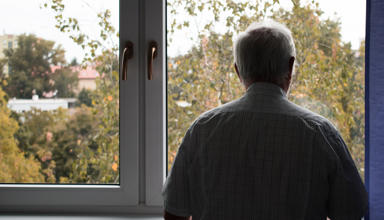It just comes in cycles, where it’ll be kicked off with just walking down the stairs, or trying to do a little bit of home schooling with the children, and then you’re just into a cycle of bitter taste, fatigue, achiness, slight chestiness. It’s a game of snakes and ladders – up and down – and, as I say, it’s worrying because you don’t know when you’ll get better or if you’ll get better (Lee Bowen, Long COVID Wales).
A support group for people living with Long COVID recently shared their experiences with the Senedd’s Health, Social Care and Sport Committee. Long COVID Wales highlighted the range of symptoms - migraines, difficulty walking, problems communicating, persistent pain, fatigue and visual disturbances. They said they’re worried they’ll never recover.
Dr Ian Frayling, a pathologist and member of Long COVID Wales, explained:
You have to learn to pace yourself. You realise that, on a bad day, your little battery has a low light and it has very little reserve. And if you come near to that, you just have to stop. But there are occasions when you can’t, you just have to go on, and then you know you’re going to pay for it. You really know. On a good day, I could deny I was unwell. And it’s soul-destroying and confusing that suddenly you go bad again.
The support group is calling for specialist centres across Wales, similar to those in England. NHS Wales’ response to date has focused on supporting self-management and drawing in the expertise of existing health services and specialists where needed.
This article looks at what we know about Long COVID, and how NHS Wales is supporting those suffering with Long COVID symptoms.
What is Long COVID?
Most people will recover from COVID-19 after a short illness. But some people are left struggling with symptoms including lasting fatigue, persistent pain and breathlessness, for months after a COVID-19 infection. This is known as Post-COVID-19 syndrome – or Long COVID. It can have a debilitating effect on people’s lives.
The National Institute for Health and Care Excellence (NICE) defines Long COVID as:
signs and symptoms that develop during or after an infection consistent with coronavirus that continues for more than 12 weeks and are not explained by an alternative diagnosis.
NICE uses the following clinical definitions for the initial illness and Long COVID at different stages:
Acute COVID-19: signs and symptoms of COVID-19 for up to four weeks.
Ongoing symptomatic COVID-19: signs and symptoms of COVID-19 from four to 12 weeks.
Post-COVID-19 syndrome: signs and symptoms that develop during or after an infection consistent with COVID-19, continue for more than 12 weeks and are not explained by an alternative diagnosis.
NICE published clinical guidance on how to identify, assess and manage the long-term effects of COVID-19. It says that Long COVID usually presents with clusters of symptoms, often overlapping, which may change over time and can affect any system within the body. Two people with Long COVID can have very different experiences.
Even people with relatively mild COVID-19 infections can be left with lasting and severe health problems. Long COVID is a condition that affects non-hospitalised individuals too.
The Welsh Government’s National Rehabilitation Framework, will help ensure support is available to patients hospitalised with acute COVID-19 through recovery and rehabilitation. But planning to meet the physical and mental health needs of a larger group of people, when there is still such limited understanding of the causes and clusters of symptoms, is far more complex.
How prevalent is Long COVID?
The exact number of people experiencing Long COVID symptoms is unclear. Research into the prevalence of the condition in the general population is underway. The largest sample to date is from the Office for National Statistics (ONS) through the Coronavirus Infection Survey (CIS).
The ONS currently estimates that 20% of people testing positive for COVID-19 exhibit symptoms for five weeks or longer, while 10% have symptoms at 12 weeks following infection.
Wales’ Technical Advisory Group (TAG) published its paper ‘Long COVID – What do we know and what do we need to know’ in February.
Dr Elaine Maxwell, from the National Institute for Health Research Centre for Engagement and Dissemination has published two evidence reviews: Living with COVID-19 and Living with COVID-19 - second Review.
The reviews highlight the detrimental physical and psychological impact that Long COVID is having on many people’s lives.
How likely is it that I will get Long COVID?
There’s still a lot of uncertainty around who’s most at risk of developing Long COVID. Dr Maxwell has said “we don’t know what the risks are” but she’s suggested the risk of getting Long COVID appears to be different from the risks of getting acutely ill with COVID-19. She says:
Most people are finding that Long COVID is more common in women than men, whereas acute hospitalisations and mortality is more common in men. We are definitely seeing more children affected with Long COVID than we were with acute hospital admissions … There aren’t a lot of studies that look at ethnicity.
Studies which show children and young people are at risk of Long COVID provide a warning that the virus does affect this age group.
Two recent UK studies suggest that women under 50 are the worst affected by Long COVID, with 70% of patients studied still affected with symptoms, including anxiety, breathlessness, fatigue, muscle pain and “brain fog”, five months after being treated in hospital.
Dr Maxwell explains that “the people who think they’re at low risk of dying from COVID don’t understand that they are at risk of Long COVID”.

What support is there for people suffering with Long COVID?
Members of Long COVID Wales told the Health, Social Care and Sport Committee that there’s little support for people suffering Long COVID symptoms. Leanne Lewis said that her hospital doctor told her “COVID-19 is new, and we don’t know how to deal with you”. Lee Bowen said the majority of people are being “dismissed” by their GP.
In the early stages of the pandemic, it seems that some GPs didn’t understand Long COVID. Dr Mair Hopkins, Chair of the Royal College of General Practitioners, acknowledges that some people suffering with Long COVID “were told to go away and get on with things”. She said “if we’ve got people who weren’t listened to in the beginning, they need to be listened to now”.
But there are no diagnostic tests for Long COVID.
We don’t yet know how the virus causes Long COVID. One thought is the immune system doesn’t return to normal after COVID and this causes ill-health. But without knowing for sure what’s causing Long COVID, it’s difficult to know how to treat it.
As Professor Daniel Altmann – a Professor of Immunology at Imperial College London - put it: “those suffering with Long COVID need more than just our sympathy or just counting their cases”.
Are specialist centres the answer?
Last October, NHS England announced a £10 million package to support people with Long COVID, including specialist clinics. There are currently no plans for specialist centres in Wales.
The Health Minister, Vaughan Gething, confirmed on 22 March that the needs of people with Long COVID in Wales will be met through existing services and that access to them will be organised and communicated by local health boards.
Those giving evidence to the Committee were divided on what the benefits of specialist centres might be.
Dr Hopkin dismissed calls for specialist clinics, stating that “very few patients will need that”. But Georgia Walby from Long COVID Wales argued that these specialist clinics are needed because people are very unwell, and they’re not able to negotiate a complex system of referrals to different places. She strongly believes “they need to go to one place and get treated”.
Dr Frayling supported the call for specialist centres to enable doctors to develop an expertise through the “pooling of minds and resources” to better understand the virus. He said that delivering support through existing services risks doing everything in a disconnected way. Dr Frayling said people with Long COVID accept there aren’t currently any specific treatments but “we’re all out there willing to be experimented on to try and find them”.
Will everyone with Long COVID symptoms fully recover?
We just don’t know. There is still huge uncertainty.
Professor Altmann said “we don’t know, for Long COVID, whether we’re talking about a story of months or years or decades, or lifelong”. He warns that “as we get the acute infection under control from the vaccine, it could be this aftermath, this legacy of Long COVID, that troubles us far more in terms of our healthcare burden and expenditure”.
Long COVID has profound implications for pandemic policy decisions, the vaccination strategy and longer term recovery.
Are you suffering with Long COVID symptoms?
The NHS Wales COVID Recovery App, launched on 20 January, has been developed to support anyone recovering from COVID-19. It provides advice from therapists, psychologists, dietitians and consultants.
If you’re suffering with Long COVID symptoms, you should contact your GP; all health boards are working closely with their GP practices to support individuals with Long COVID symptoms.
There are patient support groups, such as Long COVID Wales including support groups specifically for children and young people.
Article by Sarah Hatherley, Senedd Research, Welsh Parliament






